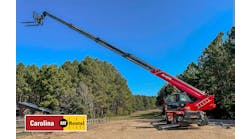Interview with Magni America’s Joe Leinwol: Evolving Safety and Training Needs
Joe Leinwol, chief sales officer, Magni America, discusses the transformation of the construction industry, the increased versatility and multifunctionality of telehandlers, preventing electrocutions, and more.
What do you see as some of the new trends in mobile elevating work platforms and telehandlers (not just with your company’s products). What are customers particularly looking for?
Leinwol: The construction industry is undergoing a transformative phase, driven by the need for more efficient, safer, and technologically advanced equipment. As job sites become increasingly complex, the demand for versatile, high-performing machines like mobile elevating work platforms (MEWPs) and telehandlers is at an all-time high. These trends are reshaping the landscape of construction equipment, and at Magni, we are not just keeping pace with these changes—we’re setting the standard.
The modern jobsite demands equipment that can adapt to a variety of tasks without sacrificing performance. This has led to an increased focus on the versatility and multifunctionality of telehandlers. Magni’s telescopic handlers are designed to be more than just lifting machines. With a wide range of attachments—from forks and winches to man baskets, hooks, jibs, winches, and more—our telehandlers can easily switch between tasks such as material handling, personnel lifting, and site cleanup. This adaptability not only maximizes the utilization of each machine but also reduces the need for multiple types of equipment on a job site, ultimately saving space and costs for rental companies and their customers.
Additionally, all of our attachments are equipped with RFID recognition, which automatically updates the load charts in real time. This provides operators with quick, accurate, and extremely safe operation—no paper charts are required.
What improvements are being made in the aerial industry in regard to safety, in your products and in the industry as a whole? Are there particular areas of safety you feel need to be addressed more, i.e., falls from height, electrocutions, entrapments, tools falling out of platforms, etc.?
Leinwol: The construction industry continues to grapple with significant safety concerns, particularly in preventing falls from height, avoiding equipment tip-overs, and ensuring the secure handling of tools at elevation. Safety remains a top priority across the industry. At Magni, we're committed to enhancing safety in our telescopic handlers through several innovations. Our machines are equipped with advanced safety features such as:
Load Moment Indicator (LMI) and Load Limiting Technology: These systems prevent overloading and ensure the machine operates within safe limits, reducing the risk of tip-overs. All Magni models come with this technology. Furthermore, our TH Fixed Boom Telehandler models are the only Fixed Boom Telehandlers in the U.S. with full LMI and load-limiting technology.
Enhanced Safety Near Powerlines: To help prevent electrocutions and ensure safe operation near overhead powerlines and other obstructions, our Magni models allow you to easily set boom height limits with the push of a button. Additionally, our RTH models enable precise rotation limit settings, providing operators with added safety and control.
Enhanced Operator Visibility: To minimize blind spots, our machines are equipped with high-resolution cameras and sensors, ensuring operators have a clear view of their surroundings. Additionally, Magni’s patented cab offers best-in-class 360-degree visibility, further reducing potential blind spots.
However, the industry as a whole still faces challenges, particularly regarding falls from height and tip-overs. While Magni's handlers address these issues through robust safety features, we believe continued focus on these areas is crucial for overall industry safety improvements.
How much have rental companies improved in regard to safety practices and training their customers in safety in recent years? How would you like to see improvement in this area?
Leinwol: Rental companies have made significant strides in improving safety practices and customer training. The emphasis on thorough training programs and regular safety audits has contributed to a safer work environment. At Magni, we support these efforts by providing our dealers with comprehensive “train the trainer” and operator training resources and safety guidelines for our equipment. However, we believe there is always room for improvement, particularly in the consistency of safety training across the industry.
What are the main new developments in your company’s products?
Leinwol: Magni's enhanced telehandler features are designed to meet the evolving needs of today's construction industry. Our latest models boast increased height and reach capabilities, along with higher weight capacities, ensuring they can handle even the most demanding tasks. We’ve also updated our touch screens to a larger size and offer dynamic displays that include real-time load charts, offering operators precise control and insight. Additionally, these models are equipped with advanced telematics systems, enabling better fleet management and predictive maintenance, ultimately reducing downtime and maximizing efficiency on the job site.
We continually ask manufacturers and rental companies about electric and hybrid aerial machines, and we find demand and acceptance is increasing each year, along with improved charging infrastructure on jobsites. Do you agree with this? What are your expectations for this market in the foreseeable future, particularly in rental?
Leinwol: The growing demand for electric and hybrid machines signals a market shift. Our Twin Power option uniquely allows operators to switch between diesel and electric power, delivering the flexibility and sustainability that today’s job sites need. Meanwhile, all new Magni machines feature Tier 5 engines, ensuring both fuel efficiency and reduced emissions.
In conclusion, Magni is committed to driving advancements in safety, efficiency, and sustainability within the telehandler market. We are excited about the future and look forward to continuing our partnership with rental companies to meet the evolving needs of the construction industry.






